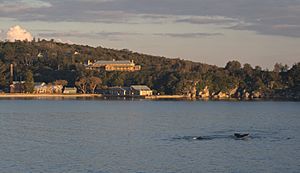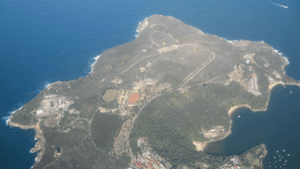North Head Quarantine Station facts for kids
Quick facts for kids North Head Quarantine Station |
|
|---|---|

The hospital, boiler house and wharf at the Quarantine Station, with humpback whales passing by
|
|
| Location | North Head Scenic Drive, Manly, Northern Beaches Council, New South Wales, Australia |
| Area | 277 hectares (680 acres) (entire North Head site) |
| Owner | Office of Environment and Heritage |
| Official name: North Head - Sydney, North Head Scenic Dr, Manly, NSW, Australia | |
| Type | Historic |
| Designated | 12 May 2006 |
| Reference no. | 105759 |
| Official name: North Head Quarantine Station & Reserve; Quarantine Station & Reserve | |
| Type | State heritage (landscape) |
| Designated | 2 April 1999 |
| Reference no. | 1003 |
| Type | Historic Landscape |
| Category | Landscape - Cultural |
| Lua error in Module:Location_map at line 420: attempt to index field 'wikibase' (a nil value). | |

The North Head Quarantine Station was a special place near Manly, Australia. It was used to keep people who might have infectious diseases separate from others. This helped stop illnesses from spreading into the community. The station is located on North Head, a beautiful spot on the north side of Sydney Harbour.
Today, this historic site is a popular tourist attraction. It is known as Q Station and includes a hotel, conference centre, and restaurants. It is also part of the Sydney Harbour National Park. The station is listed on the New South Wales State Heritage Register and the Australian National Heritage List. This means it is a very important part of Australia's history.
Contents
Why Was the Quarantine Station Needed?
Australia is an island nation. In the early days, many people arrived by ship. Sometimes, these ships carried diseases like cholera. To protect the people already living in the Colony of New South Wales, a system was needed. People who were sick, or might be sick, had to stay away from others. This was called "quarantine."
Stopping the Spread of Sickness
The idea of quarantine at North Head started early. In 1828, a ship called the Bussorah Merchant was the first to be quarantined there. This showed how important North Head's isolated location was. In 1832, Governor Ralph Darling made a law called the Quarantine Act. This law officially set aside all of North Head for quarantine purposes. It was a direct response to a cholera outbreak happening in Europe at the time.
Life at the Station
From 1832 until 1984, the station was a busy place. Thousands of people passed through its gates. They stayed there until doctors were sure they were healthy. It was a place of both fear and hope for many. People from all over the world stayed there, waiting to enter Australia.
Preserving History at North Head
Over the years, many people worked at the Quarantine Station. One important person was Dr. James Stuart. He was a doctor but also loved nature and painting. Later, in the 1960s and 70s, Herb Lavaring took charge. He realized how important the station's history was.
Herb Lavaring's Museum
Herb Lavaring decided to collect and save items from the station. He gathered old tools, medical instruments, and household items. He also worked to restore old rock carvings and headstones. These items tell the story of daily life at the station. Many of them are now in national collections, like the National Museum in Canberra. They show how people lived and worked there. For example, a rifle and manacles were used to make sure no one left without permission.
Unique Rock Carvings
One of the most special features of the Quarantine Station is its rock carvings. These carvings are found along the cliffs near the jetty. They were made by people who stayed at the station. Some carvings are very old, dating back to the early 1800s. Others are from the mid-1900s.
Messages from the Past
Some carvings were made by skilled stonemasons. They show amazing artistic talent. These carvings are like messages left behind by those who waited there. They give us a glimpse into their lives and feelings. More carvings can be seen at a rock formation called Old Man's Hat. These carvings are a unique part of Australia's history.
Images for kids
 | Leon Lynch |
 | Milton P. Webster |
 | Ferdinand Smith |




